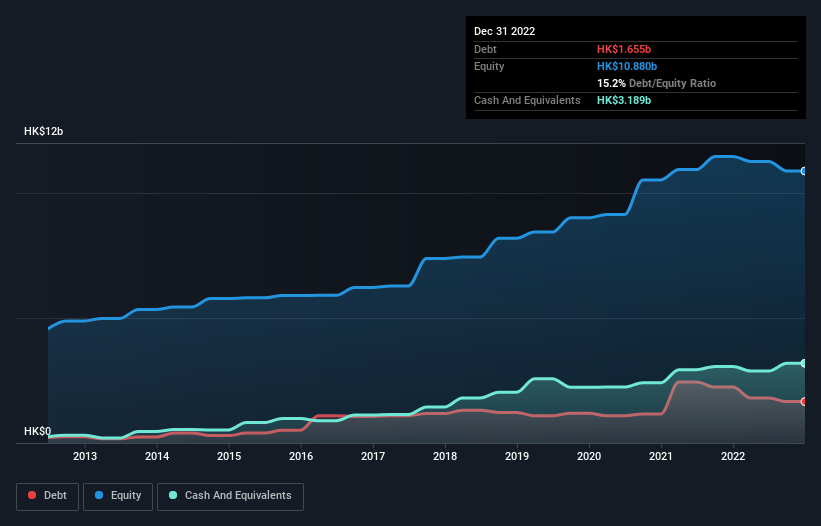- Hong Kong
- /
- Construction
- /
- SEHK:610
These 4 Measures Indicate That Wai Kee Holdings (HKG:610) Is Using Debt Reasonably Well

Howard Marks put it nicely when he said that, rather than worrying about share price volatility, 'The possibility of permanent loss is the risk I worry about... and every practical investor I know worries about.' When we think about how risky a company is, we always like to look at its use of debt, since debt overload can lead to ruin. Importantly, Wai Kee Holdings Limited (HKG:610) does carry debt. But is this debt a concern to shareholders?
Why Does Debt Bring Risk?
Debt is a tool to help businesses grow, but if a business is incapable of paying off its lenders, then it exists at their mercy. In the worst case scenario, a company can go bankrupt if it cannot pay its creditors. While that is not too common, we often do see indebted companies permanently diluting shareholders because lenders force them to raise capital at a distressed price. Having said that, the most common situation is where a company manages its debt reasonably well - and to its own advantage. The first step when considering a company's debt levels is to consider its cash and debt together.
See our latest analysis for Wai Kee Holdings
What Is Wai Kee Holdings's Net Debt?
As you can see below, Wai Kee Holdings had HK$1.66b of debt at December 2022, down from HK$2.24b a year prior. However, it does have HK$3.19b in cash offsetting this, leading to net cash of HK$1.53b.

How Strong Is Wai Kee Holdings' Balance Sheet?
The latest balance sheet data shows that Wai Kee Holdings had liabilities of HK$5.29b due within a year, and liabilities of HK$1.42b falling due after that. Offsetting these obligations, it had cash of HK$3.19b as well as receivables valued at HK$3.73b due within 12 months. So it can boast HK$210.0m more liquid assets than total liabilities.
It's good to see that Wai Kee Holdings has plenty of liquidity on its balance sheet, suggesting conservative management of liabilities. Due to its strong net asset position, it is not likely to face issues with its lenders. Simply put, the fact that Wai Kee Holdings has more cash than debt is arguably a good indication that it can manage its debt safely.
In addition to that, we're happy to report that Wai Kee Holdings has boosted its EBIT by 38%, thus reducing the spectre of future debt repayments. When analysing debt levels, the balance sheet is the obvious place to start. But it is Wai Kee Holdings's earnings that will influence how the balance sheet holds up in the future. So when considering debt, it's definitely worth looking at the earnings trend. Click here for an interactive snapshot.
Finally, while the tax-man may adore accounting profits, lenders only accept cold hard cash. While Wai Kee Holdings has net cash on its balance sheet, it's still worth taking a look at its ability to convert earnings before interest and tax (EBIT) to free cash flow, to help us understand how quickly it is building (or eroding) that cash balance. Considering the last three years, Wai Kee Holdings actually recorded a cash outflow, overall. Debt is far more risky for companies with unreliable free cash flow, so shareholders should be hoping that the past expenditure will produce free cash flow in the future.
Summing Up
While we empathize with investors who find debt concerning, you should keep in mind that Wai Kee Holdings has net cash of HK$1.53b, as well as more liquid assets than liabilities. And it impressed us with its EBIT growth of 38% over the last year. So we don't think Wai Kee Holdings's use of debt is risky. There's no doubt that we learn most about debt from the balance sheet. However, not all investment risk resides within the balance sheet - far from it. These risks can be hard to spot. Every company has them, and we've spotted 2 warning signs for Wai Kee Holdings (of which 1 can't be ignored!) you should know about.
If you're interested in investing in businesses that can grow profits without the burden of debt, then check out this free list of growing businesses that have net cash on the balance sheet.
Valuation is complex, but we're here to simplify it.
Discover if Wai Kee Holdings might be undervalued or overvalued with our detailed analysis, featuring fair value estimates, potential risks, dividends, insider trades, and its financial condition.
Access Free AnalysisHave feedback on this article? Concerned about the content? Get in touch with us directly. Alternatively, email editorial-team (at) simplywallst.com.
This article by Simply Wall St is general in nature. We provide commentary based on historical data and analyst forecasts only using an unbiased methodology and our articles are not intended to be financial advice. It does not constitute a recommendation to buy or sell any stock, and does not take account of your objectives, or your financial situation. We aim to bring you long-term focused analysis driven by fundamental data. Note that our analysis may not factor in the latest price-sensitive company announcements or qualitative material. Simply Wall St has no position in any stocks mentioned.
About SEHK:610
Wai Kee Holdings
An investment holding company, operates in the construction and infrastructure industries in Hong Kong and the People’s Republic of China.
Excellent balance sheet and good value.
Similar Companies
Market Insights
Community Narratives



